automatic transmission MERCEDES-BENZ CLK320 CABRIOLET 2002 A208 Owner's Manual
[x] Cancel search | Manufacturer: MERCEDES-BENZ, Model Year: 2002, Model line: CLK320 CABRIOLET, Model: MERCEDES-BENZ CLK320 CABRIOLET 2002 A208Pages: 346
Page 6 of 346

3 ContentsAutomatic transmission ............... 195
Parking brake .................................204
Driving instructions ......................205
Drive sensibly –
save fuel .......................................205
Drinking and driving .................205
Pedals ...........................................205
Power assistance ........................206
Brakes ..........................................206
Driving off ...................................207
Parking ........................................208
Tires .............................................208
Snow chains ................................ 211
Winter driving
instructions ................................. 211
Deep water .................................. 213
Passenger compartment ........... 213
Traveling abroad ........................ 213
Cruise control ................................. 214
Brake assist system
(BAS) ........................................... 216
Antilock brake system
(ABS) ........................................... 218Electronic stability program
(ESP) ........................................... 220
What you should know
at the gas station ...................... 224
Check regularly and
before a long trip ...................... 226
Instrument cluster displayMalfunction and
indicator lamps in the
instrument cluster .................... 228
On-board diagnostic system
Check engine malfunction
indicator lamp ............................ 228
Brake warning lamp .................. 229
Supplemental restraint
system (SRS) indicator lamp .... 230
Fuel reserve and fuel cap
placement warning ................... 230
Electronic stability program
(ESP) — warning lamp ............... 231
BAS/ESP malfunction
indicator lamp ............................ 231ABS malfunction
indicator lamp ............................. 231
Telescoping steering column –
indicator lamp .............................232
Seat belt warning lamp .............232
Malfunction and
indicator lamps in the
center console ...........................232
AIRBAG OFF indicator lamp .....232
Roll bar warning lamp ...............233
Malfunction and
warning messages in the
multifunction display ...............234
DISPLAY DEFECTIVE
(engine control unit) ..................235
DISPLAY DEFECTIVE
(several systems) ........................235
BATTERY/ALTERNATOR ...........236
ABS-SYSTEM ...............................237
BRAKE ASSIST ...........................237
BRAKE LINING WEAR ..............238
BRAKE FLUID .............................238
PARKING BRAKE .......................239
J_A208.book Seite 3 Donnerstag, 31. Mai 2001 9:35 09
Page 7 of 346

4 Contents
ENGINE FAN ...............................239
COOLANT (coolant level) ..........240
COOLANT TEMP.
(coolant temperature) ................ 241
LIGHTING SYSTEM ....................242
LIGHT SENSOR ...........................243
STEER. WHEEL ADJUST. ...........243
ENGINE OIL LEVEL ...................244
ELEC. STABIL. PROG.
(Electronic stability
program) ......................................245
REMOVE KEY .............................245
WASHER FLUID ..........................246
TELE AID .....................................247
Practical hintsFirst aid kit .....................................250
Shelf below rear window ..............250
Stowing things in
the vehicle ..................................250
Luggage cover .................................250
Fuses ................................................252
Hood .................................................254
Checking engine oil level .............256Automatic transmission
fluid level ................................... 257
Coolant level ................................... 257
Adding coolant ........................... 258
Windshield washer / headlamp
cleaning system ........................ 259
Windshield and headlamp
washer fluid mixing ratio ........ 259
Spare wheel, vehicle tools,
storage compartment ............... 260
Vehicle jack .................................... 261
Wheels ............................................ 262
Tire replacement ....................... 262
Rotating wheels ......................... 263
Spare wheel .................................... 264
Changing wheels ........................... 266
Tire inflation pressure ..................271
Battery ............................................. 272
Jump starting ..................................274
Towing the vehicle .........................276
Exterior lamps ............................... 280
Headlamp assembly .................. 281
Taillamp assemblies .................. 283
Adjusting headlamp aim .............. 285Changing batteries in
the electronic key .....................288
Synchronizing remote
control .........................................290
Raising soft top manually ............. 291
Antenna ...........................................298
Manual release for
fuel filler flap .............................299
Replacing wiper blade insert .......299
Vehicle careCleaning and care
of the vehicle .............................302
Power washer ..............................303
Paintwork, painted body
components .................................303
Engine cleaning ..........................304
Tar stains .....................................304
Vehicle washing .........................304
Ornamental moldings ................304
Headlamps, taillamps,
turn signal lenses ......................305
Window cleaning .......................305
Plastic and rubber parts ............305
J_A208.book Seite 4 Donnerstag, 31. Mai 2001 9:35 09
Page 180 of 346
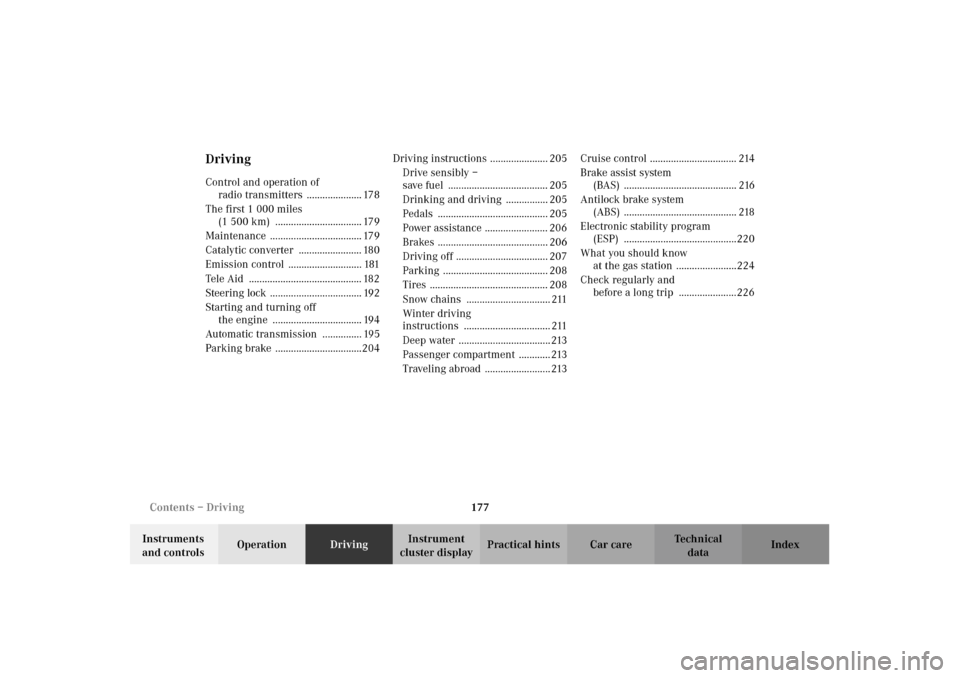
177 Contents – Driving
Technical
data Instruments
and controlsOperationDrivingInstrument
cluster displayPractical hints Car care Index
DrivingControl and operation of
radio transmitters ..................... 178
The first 1 000 miles
(1 500 km) ................................. 179
Maintenance ................................... 179
Catalytic converter ........................ 180
Emission control ............................ 181
Tele Aid ........................................... 182
Steering lock ................................... 192
Starting and turning off
the engine .................................. 194
Automatic transmission ............... 195
Parking brake .................................204Driving instructions ...................... 205
Drive sensibly –
save fuel ...................................... 205
Drinking and driving ................ 205
Pedals .......................................... 205
Power assistance ........................ 206
Brakes .......................................... 206
Driving off ................................... 207
Parking ........................................ 208
Tires ............................................. 208
Snow chains ................................ 211
Winter driving
instructions ................................. 211
Deep water ...................................213
Passenger compartment ............ 213
Traveling abroad ......................... 213Cruise control ................................. 214
Brake assist system
(BAS) ........................................... 216
Antilock brake system
(ABS) ........................................... 218
Electronic stability program
(ESP) ...........................................220
What you should know
at the gas station .......................224
Check regularly and
before a long trip ......................226
J_A208.book Seite 177 Donnerstag, 31. Mai 2001 9:35 09
Page 191 of 346
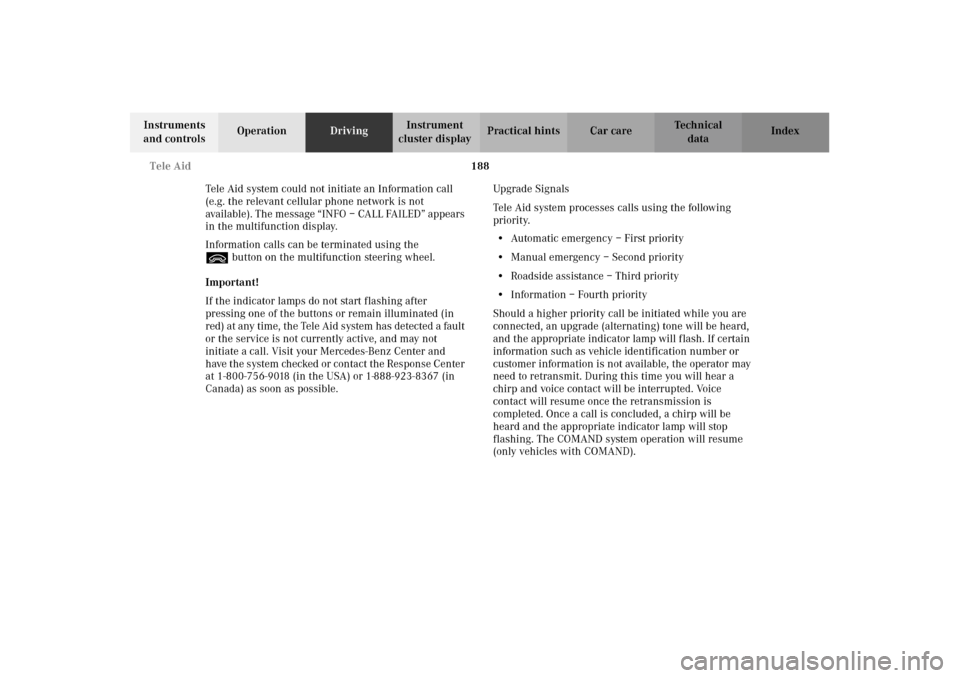
188 Tele Aid
Technical
data Instruments
and controlsOperationDrivingInstrument
cluster displayPractical hints Car care Index
Tele Aid system could not initiate an Information call
(e.g. the relevant cellular phone network is not
available). The message “INFO – CALL FAILED” appears
in the multifunction display.
Information calls can be terminated using the
ìbutton on the multifunction steering wheel.
Important!
If the indicator lamps do not start flashing after
pressing one of the buttons or remain illuminated (in
red) at any time, the Tele Aid system has detected a fault
or the service is not currently active, and may not
initiate a call. Visit your Mercedes-Benz Center and
have the system checked or contact the Response Center
at 1-800-756-9018 (in the USA) or 1-888-923-8367 (in
Canada) as soon as possible.Upgrade Signals
Tele Aid system processes calls using the following
priority.
•Automatic emergency – First priority
•Manual emergency – Second priority
•Roadside assistance – Third priority
•Information – Fourth priority
Should a higher priority call be initiated while you are
connected, an upgrade (alternating) tone will be heard,
and the appropriate indicator lamp will flash. If certain
information such as vehicle identification number or
customer information is not available, the operator may
need to retransmit. During this time you will hear a
chirp and voice contact will be interrupted. Voice
contact will resume once the retransmission is
completed. Once a call is concluded, a chirp will be
heard and the appropriate indicator lamp will stop
flashing. The COMAND system operation will resume
(only vehicles with COMAND).
J_A208.book Seite 188 Donnerstag, 31. Mai 2001 9:35 09
Page 198 of 346
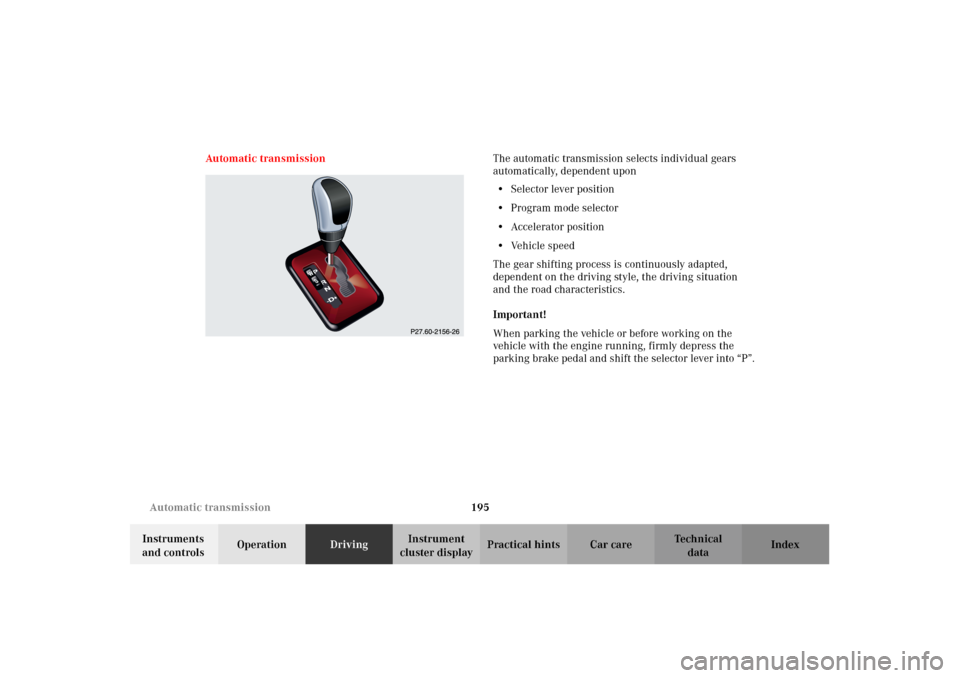
195 Automatic transmission
Technical
data Instruments
and controlsOperationDrivingInstrument
cluster displayPractical hints Car care Index Automatic transmissionThe automatic transmission selects individual gears
automatically, dependent upon
•Selector lever position
•Program mode selector
•Accelerator position
•Vehicle speed
The gear shifting process is continuously adapted,
dependent on the driving style, the driving situation
and the road characteristics.
Important!
When parking the vehicle or before working on the
vehicle with the engine running, firmly depress the
parking brake pedal and shift the selector lever into “P”.
J_A208.book Seite 195 Donnerstag, 31. Mai 2001 9:35 09
Page 199 of 346
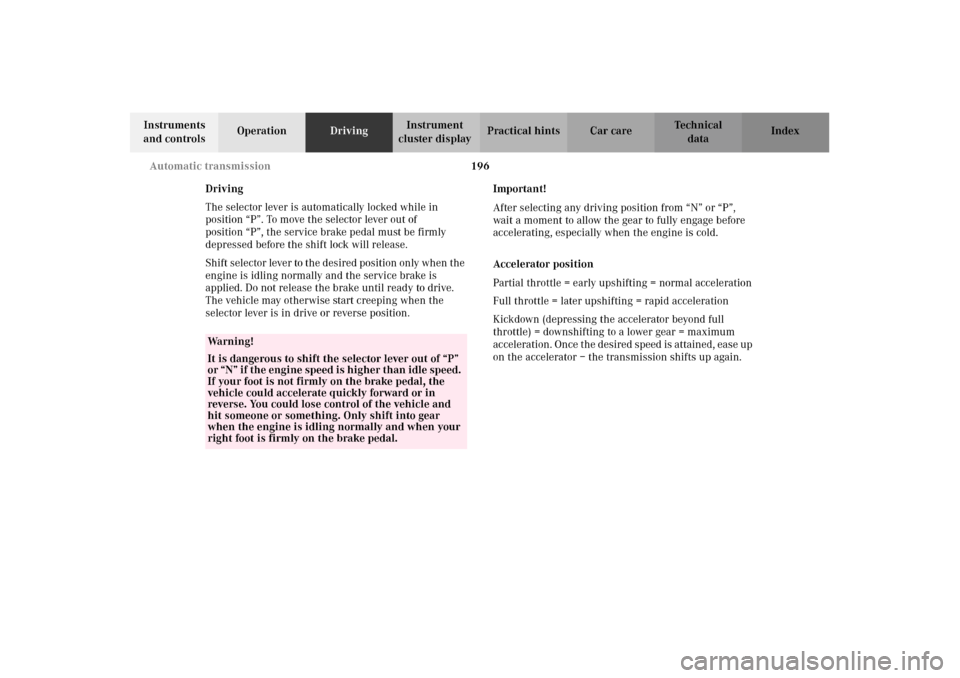
196 Automatic transmission
Technical
data Instruments
and controlsOperationDrivingInstrument
cluster displayPractical hints Car care Index
Driving
The selector lever is automatically locked while in
position “P”. To move the selector lever out of
position “P”, the service brake pedal must be firmly
depressed before the shift lock will release.
Shift selector lever to the desired position only when the
engine is idling normally and the service brake is
applied. Do not release the brake until ready to drive.
The vehicle may otherwise start creeping when the
selector lever is in drive or reverse position.Important!
After selecting any driving position from “N” or “P”,
wait a moment to allow the gear to fully engage before
accelerating, especially when the engine is cold.
Accelerator position
Partial throttle = early upshifting = normal acceleration
Full throttle = later upshifting = rapid acceleration
Kickdown (depressing the accelerator beyond full
throttle) = downshifting to a lower gear = maximum
ac celeration . On ce t he d es ire d s peed is attain ed , eas e up
on the accelerator – the transmission shifts up again.
Wa r n i n g !
It is dangerous to shift the selector lever out of “P”
or “N” if the engine speed is higher than idle speed.
If your foot is not firmly on the brake pedal, the
vehicle could accelerate quickly forward or in
reverse. You could lose control of the vehicle and
hit someone or something. Only shift into gear
when the engine is idling normally and when your
right foot is firmly on the brake pedal.
J_A208.book Seite 196 Donnerstag, 31. Mai 2001 9:35 09
Page 200 of 346
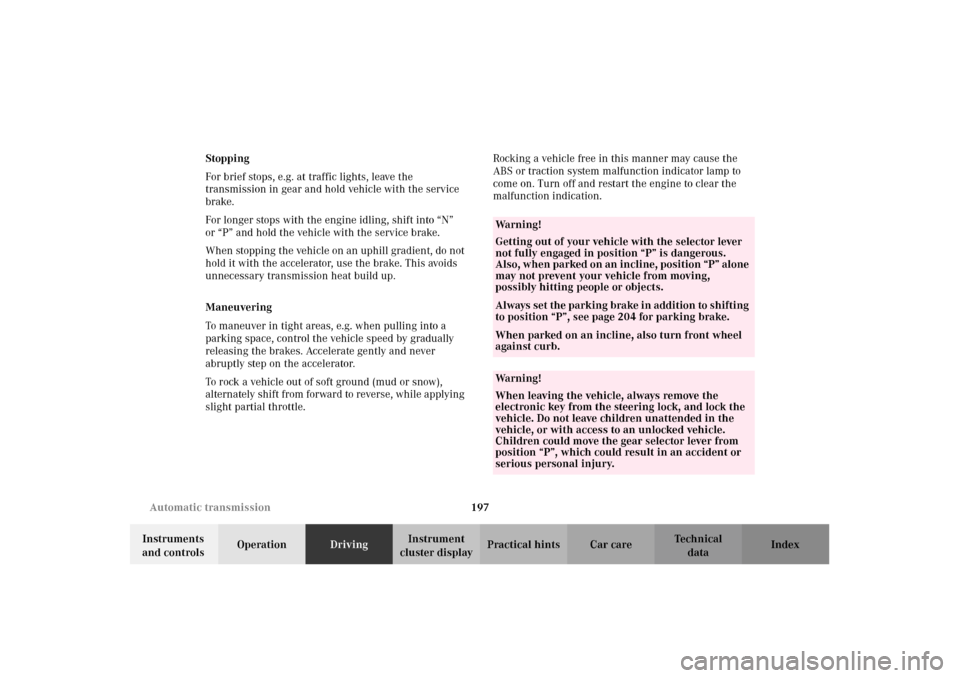
197 Automatic transmission
Technical
data Instruments
and controlsOperationDrivingInstrument
cluster displayPractical hints Car care Index Stopping
For brief stops, e.g. at traffic lights, leave the
transmission in gear and hold vehicle with the service
brake.
For longer stops with the engine idling, shift into “N”
or “P” and hold the vehicle with the service brake.
When stopping the vehicle on an uphill gradient, do not
hold it with the accelerator, use the brake. This avoids
unnecessary transmission heat build up.
Maneuvering
To maneuver in tight areas, e.g. when pulling into a
parking space, control the vehicle speed by gradually
releasing the brakes. Accelerate gently and never
abruptly step on the accelerator.
To rock a vehicle out of soft ground (mud or snow),
alternately shift from forward to reverse, while applying
slight partial throttle.Rocking a vehicle free in this manner may cause the
ABS or traction system malfunction indicator lamp to
come on. Turn off and restart the engine to clear the
malfunction indication.
Wa r n i n g !
Getting out of your vehicle with the selector lever
not fully engaged in position “P” is dangerous.
Also, when parked on an incline, position “P” alone
may not prevent your vehicle from moving,
possibly hitting people or objects.Always set the parking brake in addition to shifting
to position “P”, see page 204 for parking brake. When parked on an incline, also turn front wheel
against curb.Wa r n i n g !
When leaving the vehicle, always remove the
electronic key from the steering lock, and lock the
vehicle. Do not leave children unattended in the
vehicle, or with access to an unlocked vehicle.
Children could move the gear selector lever from
position “P”, which could result in an accident or
serious personal injury.
J_A208.book Seite 197 Donnerstag, 31. Mai 2001 9:35 09
Page 201 of 346
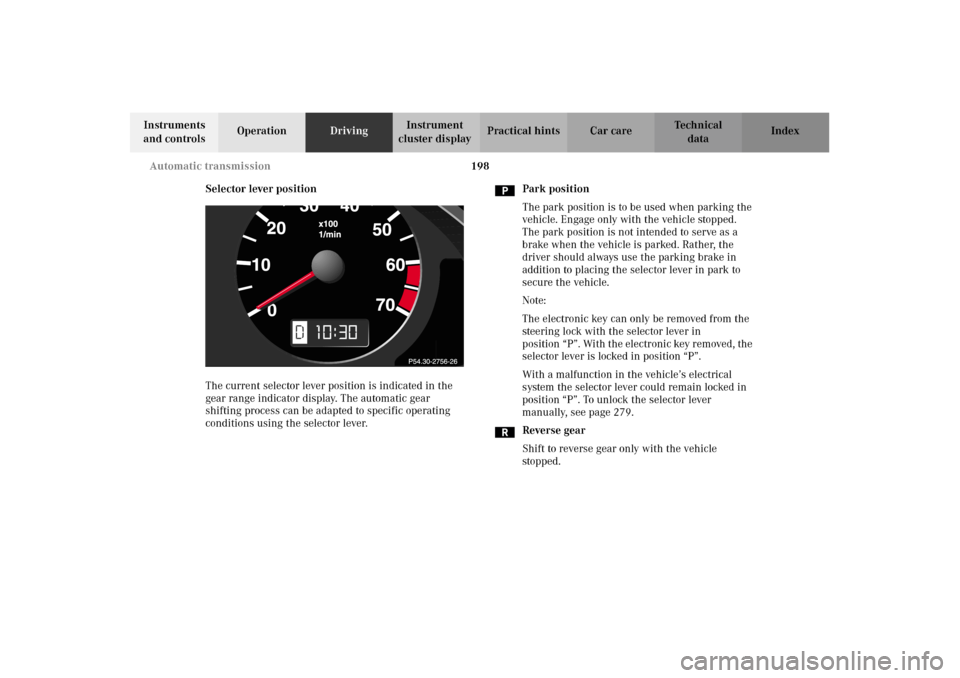
198 Automatic transmission
Technical
data Instruments
and controlsOperationDrivingInstrument
cluster displayPractical hints Car care Index
Selector lever position
The current selector lever position is indicated in the
gear range indicator display. The automatic gear
shifting process can be adapted to specific operating
conditions using the selector lever.Park position
The park position is to be used when parking the
vehicle. Engage only with the vehicle stopped.
The park position is not intended to serve as a
brake when the vehicle is parked. Rather, the
driver should always use the parking brake in
addition to placing the selector lever in park to
secure the vehicle.
Note:
The electronic key can only be removed from the
steering lock with the selector lever in
position “P”. With the electronic key removed, the
selector lever is locked in position “P”.
With a malfunction in the vehicle’s electrical
system the selector lever could remain locked in
position “P”. To unlock the selector lever
manually, see page 279.
Reverse gear
Shift to reverse gear only with the vehicle
stopped.
10
J_A208.book Seite 198 Donnerstag, 31. Mai 2001 9:35 09
Page 202 of 346
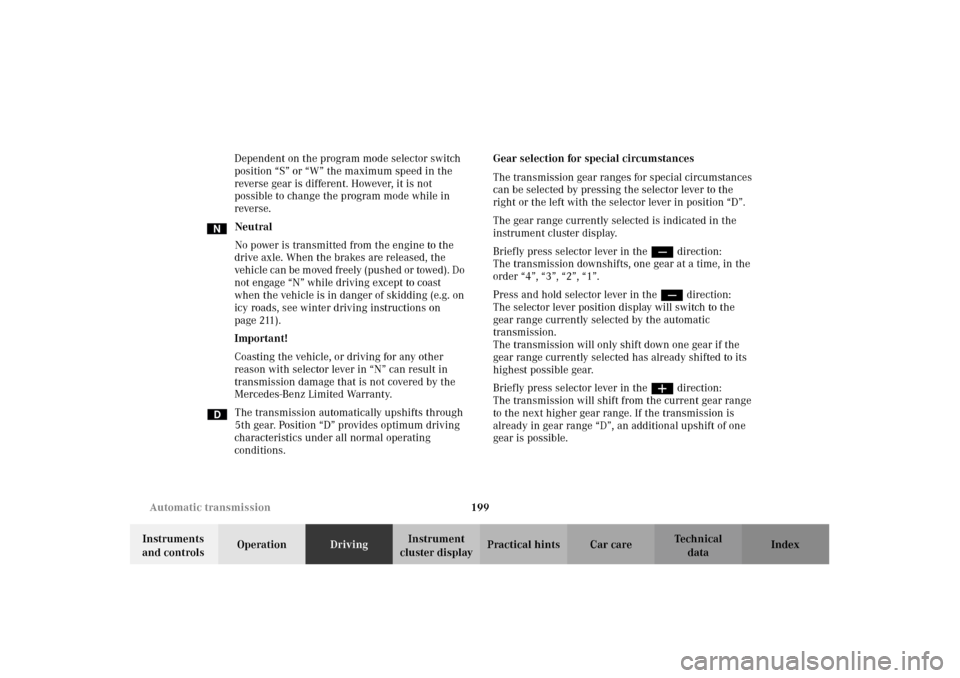
199 Automatic transmission
Technical
data Instruments
and controlsOperationDrivingInstrument
cluster displayPractical hints Car care Index Dependent on the program mode selector switch
position “S” or “W” the maximum speed in the
reverse gear is different. However, it is not
possible to change the program mode while in
reverse.
Neutral
No power is transmitted from the engine to the
drive axle. When the brakes are released, the
vehicle can be moved freely (pushed or towed). Do
not engage “N” while driving except to coast
when the vehicle is in danger of skidding (e.g. on
icy roads, see winter driving instructions on
page 211).
Important!
Coasting the vehicle, or driving for any other
reason with selector lever in “N” can result in
transmission damage that is not covered by the
Mercedes-Benz Limited Warranty.
The transmission automatically upshifts through
5th gear. Position “D” provides optimum driving
characteristics under all normal operating
conditions.Gear selection for special circumstances
The transmission gear ranges for special circumstances
can be selected by pressing the selector lever to the
right or the left with the selector lever in position “D”.
The gear range currently selected is indicated in the
instrument cluster display.
Briefly press selector lever in the ç direction:
The transmission downshifts, one gear at a time, in the
order “4”, “3”, “2”, “1”.
Press and hold selector lever in the ç direction:
The selector lever position display will switch to the
gear range currently selected by the automatic
transmission.
The transmission will only shift down one gear if the
gear range currently selected has already shifted to its
highest possible gear.
Briefly press selector lever in the æ direction:
The transmission will shift from the current gear range
to the next higher gear range. If the transmission is
already in gear range “D”, an additional upshift of one
gear is possible.
J_A208.book Seite 199 Donnerstag, 31. Mai 2001 9:35 09
Page 203 of 346
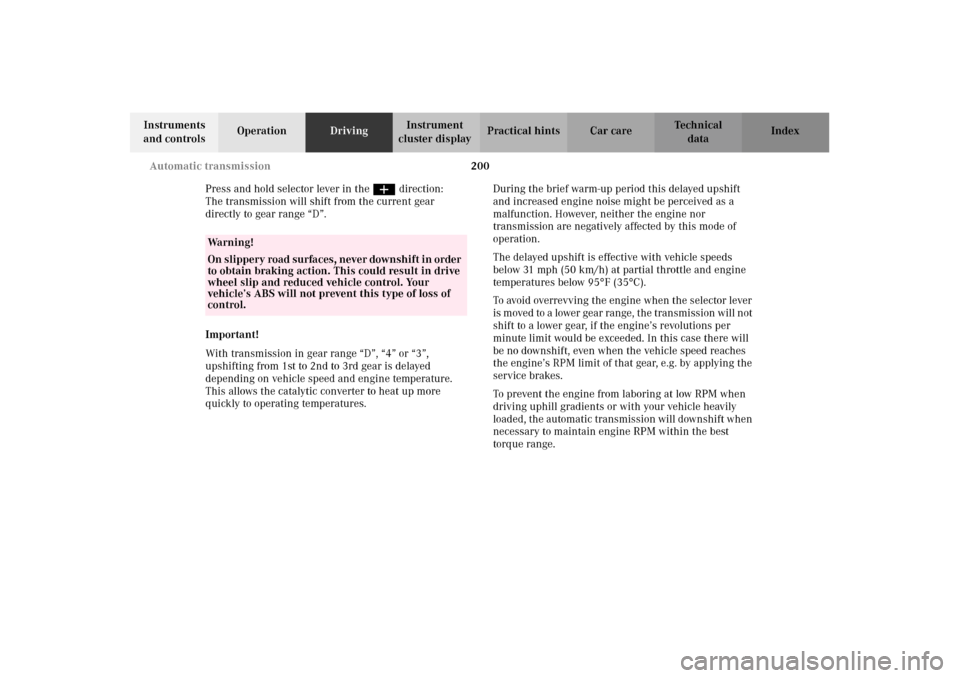
200 Automatic transmission
Technical
data Instruments
and controlsOperationDrivingInstrument
cluster displayPractical hints Car care Index
Press and hold selector lever in the æ direction:
The transmission will shift from the current gear
directly to gear range “D”.
Important!
With transmission in gear range “D”, “4” or “3”,
upshifting from 1st to 2nd to 3rd gear is delayed
depending on vehicle speed and engine temperature.
This allows the catalytic converter to heat up more
quickly to operating temperatures.During the brief warm-up period this delayed upshift
and increased engine noise might be perceived as a
malfunction. However, neither the engine nor
transmission are negatively affected by this mode of
operation.
The delayed upshift is effective with vehicle speeds
below 31 mph (50 km/h) at partial throttle and engine
temperatures below 95
°F (35
°C).
To avoid overrevving the engine when the selector lever
is m ove d to a lower gear range , t he tran smi ss ion will n ot
shift to a lower gear, if the engine’s revolutions per
minute limit would be exceeded. In this case there will
be no downshift, even when the vehicle speed reaches
the engine’s RPM limit of that gear, e.g. by applying the
service brakes.
To prevent the engine from laboring at low RPM when
driving uphill gradients or with your vehicle heavily
loaded, the automatic transmission will downshift when
necessary to maintain engine RPM within the best
torque range.
Wa r n i n g !
O n s l i p p e ry ro a d s u rfa c es , n eve r d ow n s h i f t i n o rd e r
to obtain braking action. This could result in drive
wheel slip and reduced vehicle control. Your
vehicle’s ABS will not prevent this type of loss of
control.
J_A208.book Seite 200 Donnerstag, 31. Mai 2001 9:35 09